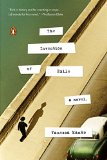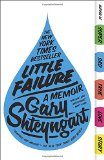Summary | Excerpt | Reading Guide | Reviews | Beyond the book | Read-Alikes | Genres & Themes | Author Bio

A singularly talented writer makes his literary debut with this provocative, soulful, and sometimes hilarious story of a failed journalist asked to do the unthinkable: Forge Holocaust-restitution claims for old Russian Jews in Brooklyn, New York.
Yevgeny Gelman, grandfather of Slava Gelman, "didn't suffer in the exact way" he needs to have suffered to qualify for the restitution the German government has been paying out to Holocaust survivors. But suffer he has - as a Jew in the war; as a second-class citizen in the USSR; as an immigrant to America. So? Isn't his grandson a "writer"?
High-minded Slava wants to put all this immigrant scraping behind him. Only the American Dream is not panning out for him - Century, the legendary magazine where he works as a researcher, wants nothing greater from him. Slava wants to be a correct, blameless American - but he wants to be a lionized writer even more.
Slava's turn as the Forger of South Brooklyn teaches him that not every fact is the truth, and not every lie a falsehood. It takes more than law-abiding to become an American; it takes the same self-reinvention in which his people excel. Intoxicated and unmoored by his inventions, Slava risks exposure. Cornered, he commits an irrevocable act that finally grants him a sense of home in America, but not before collecting a price from his family.
A Replacement Life is a dark, moving, and beautifully written novel about family, honor, and justice.
- 1 -
s u n da y, j u l y 1 6 , 2 0 0 6
The telephone rang just after five. Unconscionably, the day was already preparing to begin, a dark blue lengthening across the sky. Hadn't thenight only started? Slava's head said so. But in the cobalt square of the window, the sun was looking for a way up, the great towers of the Upper East Side ready for gilding.
Who was misdialing at five o'clock in the morning on Sunday? Slava's landline never rang. Even telemarketers had given up on him, you have to admit an achievement. His family no longer called because he had forbidden it. His studio, miraculously affordable even for a junior employee of a
Midtown magazine, rang with echoes, nothing but a futon, a writing desk, a torchiere wrapped in cast-iron
vines (forced on him by his grandfather), and a tube television he never turned on. Once in a while, he imagined vanishing into the walls, like a spirit in Poe, and chuckled bitterly.
He thought about getting up, a ...
A Replacement Life is full of big moral questions, but more than that, it is a novel about becoming a writer. Slava... wants to be a famous writer. It is this desire that leads him to agree to write restitution letters for his family and acquaintances...He invents episodes that he imagines were part of her life, but he transfers them to other people. Thus, he replaces the lost years of her life, and in doing so, he performs the very essence of a writer’s task: to create “replacement lives.” The difference between lies and truth, and facts and fiction is at the center of this novel: “If you wanted to write a good story, the facts had to become a story’s instruments. You couldn’t write without being coarse to the facts."..continued
Full Review
 (820 words)
(820 words)
(Reviewed by Alta Ifland).

 Belarusian-born Boris Fishman is part of a group of outstanding American writers of Russian or East-European origin which includes Josip Novakovich, from Croatia; Aleksandar Hemon, from Bosnia; Olga Grushin, from Russia; and Gary Shteyngart, of Russian-Jewish origin (who is explored thoroughly in this review of Little Failure). With the exception of Olga Grushin, whose novels take place entirely in Russia, the others move between the Old and the New World, creating a universe populated with immigrants who may speak different languages but share similar characteristics: a tendency to congregate and chat for hours about the old days, good or bad; a profound disrespect for the law; a wariness of the American ways; a pathological fear of cold ...
Belarusian-born Boris Fishman is part of a group of outstanding American writers of Russian or East-European origin which includes Josip Novakovich, from Croatia; Aleksandar Hemon, from Bosnia; Olga Grushin, from Russia; and Gary Shteyngart, of Russian-Jewish origin (who is explored thoroughly in this review of Little Failure). With the exception of Olga Grushin, whose novels take place entirely in Russia, the others move between the Old and the New World, creating a universe populated with immigrants who may speak different languages but share similar characteristics: a tendency to congregate and chat for hours about the old days, good or bad; a profound disrespect for the law; a wariness of the American ways; a pathological fear of cold ...

If you liked A Replacement Life, try these:

by Vanessa Manko
Published 2015
Through the unforgettable character of Austin Voronkov, Manko explores the little-known period in American history of the Palmer Raids and the far-reaching implications of exile and loss.

by Gary Shteyngart
Published 2014
A memoir of an immigrant family coming to America, as told by a lifelong misfit who forged from his imagination an essential literary voice and, against all odds, a place in the world.




Too often we enjoy the comfort of opinion without the discomfort of thought.
Click Here to find out who said this, as well as discovering other famous literary quotes!